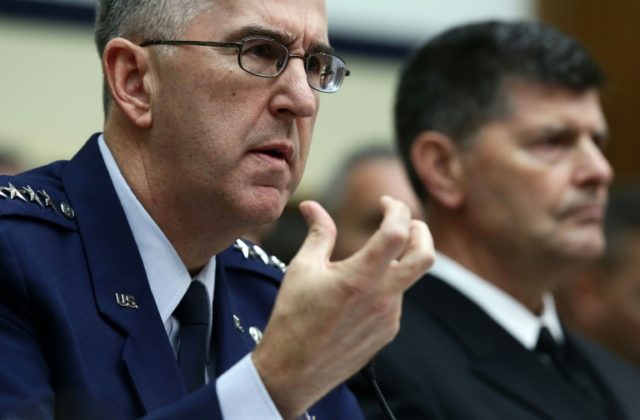WASHINGTON, DC — Some of the “specialized capabilities” necessary to sustain America’s nuclear stockpile and remain a credible nuclear power “have either atrophied or become obsolete” while U.S. rival China continues to modernize and expand its atomic weapons, a top U.S. commander warned lawmakers on Tuesday.
While testifying before the Senate Armed Services Committee, Gen. John Hyten, the head of U.S. Strategic Command (STRATCOM), which is charged with ensuring America’s strategic capabilities remain safe, secure, reliable, and ready, cautioned:
To remain a credible nuclear state, the U.S. must have modern facilities and a highly skilled workforce able to maintain a credible nuclear deterrent. Across the nuclear enterprise, many of the specialized capabilities required to complete stockpile work have either atrophied or become obsolete. As a result, the U.S is not capable of producing and/or manufacturing many of the materials and unique components in the quantities needed to sustain the stockpile over the long term.
Gen. Hyten suggested the United States is not producing “plutonium pits” at a sufficient rate to sustain its nuclear deterrence capabilities, which include force readiness and the ability to respond to an adversary, telling lawmakers:
Re-establishing the capability to produce plutonium pits at a production rate sufficient to support planned weapon sustainment activities must be a national priority. … Delays in developing a viable plutonium pit production capability will eventually affect our ability to meet the nation’s deterrence mission requirements.
In addition to plutonium manufacturing, we require critical infrastructure investments in uranium processing, tritium processing, and lithium component production. Any shortcomings in these infrastructure projects represent a real risk to maintain force readiness and our capability to respond to either a technical issue with our stockpile or adversary advancements in their capabilities.
The STRATCOM commander stressed that the U.S. military is facing challenges in retaining the highly skilled workforce necessary to carry out surveillance, sustainment, and modernization activities at nuclear facilities.
Gen. Hyten also cautioned that the “continued proliferation of sophisticated small Unmanned Aircraft Systems (sUAS)” or drones poses a challenge to keeping America’s nuclear stockpile safe, telling the Senate panel:
The availability, ease of use, and capabilities of these sUAS vehicles represents a growing threat to our [nuclear] deterrence operations. We rapidly implemented counter-sUAS systems into our security architecture, and continue to refine our tactics, techniques, and procedures to address the developing threat. Pacing this sUAS threat will require vigilance and dedicated investment as these capabilities continue to evolve.
While the U.S. is facing nuclear capability shortcomings, China is moving full speed ahead with its efforts to modernize and expand its nuclear weapons.
Gen. Hyten noted:
China’s continued long-term military modernization of both conventional and strategic forces has implications in the Indo-Pacific region and beyond. They are aggressively modernizing their mobile nuclear forces and re-engineering their long-range ballistic missiles to carry multiple nuclear warheads.
…
China and Russia continue to place increased importance on nuclear weapons in their strategy and doctrine as well as expand the number and diversity of their nuclear weapons and weapon systems.
The top American commander acknowledged that China did not reciprocate U.S. efforts to reduce its nuclear stockpile. To the contrary, he emphasized that the Asian giant has stepped up its development of nuclear weapons.
Gen. Hyten told the Senate panel:
We remain committed to strengthening nonproliferation and nuclear security, and we stand ready to re-engage on future arms control agreements. However, a commitment to arms control and other reductions cannot be unilateral in the face of ever-increasing threats. This would harm the readiness of our nuclear deterrent, destabilize relations with potential adversaries, and reduce the confidence our allies place in our extended deterrence guarantees.
STRATCOM is charged with detecting and deterring attacks against the United States and its allies. The combatant command’s mission includes nuclear deterrence, space, and cyberspace capabilities.

COMMENTS
Please let us know if you're having issues with commenting.